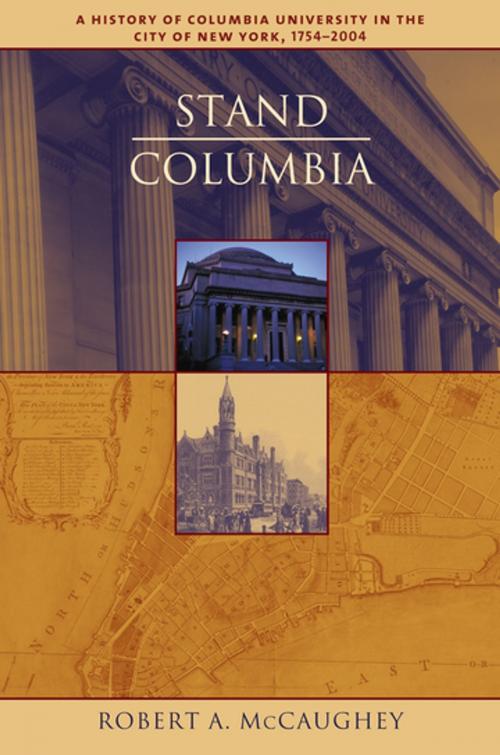Stand, Columbia
A History of Columbia University
Nonfiction, Reference & Language, Education & Teaching, Higher Education, History, Americas, United States| Author: | Robert McCaughey | ISBN: | 9780231503556 |
| Publisher: | Columbia University Press | Publication: | October 22, 2003 |
| Imprint: | Columbia University Press | Language: | English |
| Author: | Robert McCaughey |
| ISBN: | 9780231503556 |
| Publisher: | Columbia University Press |
| Publication: | October 22, 2003 |
| Imprint: | Columbia University Press |
| Language: | English |
Stand, Columbia! Alma Mater
Through the storms of Time abide
Stand, Columbia! Alma Mater
Through the storms of Time abide.
"Stand, Columbia!" by Gilbert Oakley Ward, Columbia College 1902 (1904)
Marking the 250th anniversary of one of America's oldest and most formidable educational institutions, this comprehensive history of Columbia University extends from the earliest discussions in 1704 about New York City being "a fit Place for a colledge" to the recent inauguration of president Lee Bollinger, the nineteenth, on Morningside Heights. One of the original "Colonial Nine" schools, Columbia's distinctive history has been intertwined with the history of New York City. Located first in lower Manhattan, then in midtown, and now in Morningside Heights, Columbia's national and international stature have been inextricably identified with its urban setting.
Columbia was the first of America's "multiversities," moving beyond its original character as a college dedicated to undergraduate instruction to offer a comprehensive program in professional and graduate studies. Medicine, law, architecture, and journalism have all looked to the graduates and faculty of Columbia's schools to provide for their ongoing leadership and vitality. In 2003, a sampling of Columbia alumni include one member of the United States Supreme Court, three United States senators, three congressmen, three governors (New York, New Jersey, and California), a chief justice of the New York Court of Appeals, and a president of the New York City Board of Education. But it is perhaps as a contributor of ideas and voices to the broad discourse of American intellectual life that Columbia has most distinguished itself. From The Federalist Papers, written by Columbians John Jay and Alexander Hamilton, to Charles Beard's An Economic Interpretation of the Constitution and Jack Kerouac's On the Road to Edward Said's Orientalism, Columbia and its graduates have greatly influenced American intellectual and public life. Stand, Columbia also examines the experiences of immigrants, women, Jews, African Americans, and other groups as it takes critical measure of the University's efforts to become more inclusive and more reflective of the diverse city that it calls home.
Stand, Columbia! Alma Mater
Through the storms of Time abide
Stand, Columbia! Alma Mater
Through the storms of Time abide.
"Stand, Columbia!" by Gilbert Oakley Ward, Columbia College 1902 (1904)
Marking the 250th anniversary of one of America's oldest and most formidable educational institutions, this comprehensive history of Columbia University extends from the earliest discussions in 1704 about New York City being "a fit Place for a colledge" to the recent inauguration of president Lee Bollinger, the nineteenth, on Morningside Heights. One of the original "Colonial Nine" schools, Columbia's distinctive history has been intertwined with the history of New York City. Located first in lower Manhattan, then in midtown, and now in Morningside Heights, Columbia's national and international stature have been inextricably identified with its urban setting.
Columbia was the first of America's "multiversities," moving beyond its original character as a college dedicated to undergraduate instruction to offer a comprehensive program in professional and graduate studies. Medicine, law, architecture, and journalism have all looked to the graduates and faculty of Columbia's schools to provide for their ongoing leadership and vitality. In 2003, a sampling of Columbia alumni include one member of the United States Supreme Court, three United States senators, three congressmen, three governors (New York, New Jersey, and California), a chief justice of the New York Court of Appeals, and a president of the New York City Board of Education. But it is perhaps as a contributor of ideas and voices to the broad discourse of American intellectual life that Columbia has most distinguished itself. From The Federalist Papers, written by Columbians John Jay and Alexander Hamilton, to Charles Beard's An Economic Interpretation of the Constitution and Jack Kerouac's On the Road to Edward Said's Orientalism, Columbia and its graduates have greatly influenced American intellectual and public life. Stand, Columbia also examines the experiences of immigrants, women, Jews, African Americans, and other groups as it takes critical measure of the University's efforts to become more inclusive and more reflective of the diverse city that it calls home.















